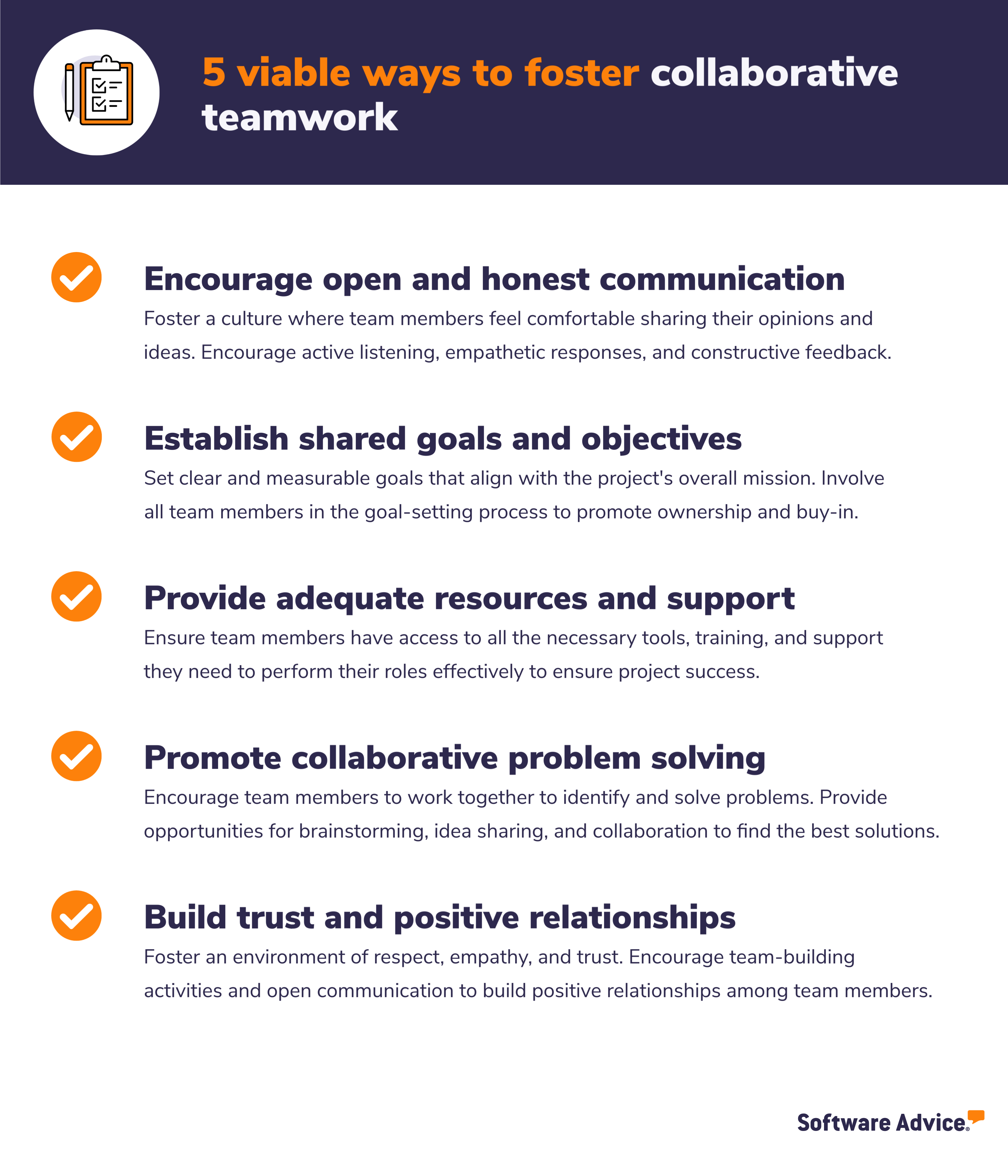How to Increase Collaboration Between Teams for Better Output
Imagine leading a team to complete a critical project within a tight deadline. You've crafted a detailed plan, assigned roles, and communicated expectations, but communication gaps and lack of team collaboration are causing the project to fall behind schedule.The stress is mounting, and you're starting to feel like you're in over your head, but you need to find a solution before the project spirals out of control. If this sounds familiar, take some solace in knowing that you're not alone.
Many business owners, team leaders, and even project managers often face such challenges that derail projects. Collaborative teamwork is essential for successful outcomes and opening the door to effective communication. Elizabeth Harrin [1], with two decades of experience in project management and founder of Rebel's Guide To Project Management, shared insights on five elements of collaborative teamwork and ways to foster it. Read on to learn more.
Elizabeth Harrin
Founder of Rebel's Guide To Project Management
5 ways to foster collaborative teamwork
Now that we’ve discussed the essential elements of collaborative teamwork, here are five actionable steps to help foster them on your projects:

#1 Encourage open and honest communication
Open communication in a team setting can foster trust, respect, and understanding. Encourage team members to speak freely, express their ideas, and be transparent with each other. When everyone feels comfortable expressing their thoughts and opinions, it can lead to more effective problem-solving. For instance, soliciting feedback from team members can help ensure that all perspectives are considered when making decisions.
Proven tips for success
Establish clear and consistent communication channels.
Use an open discussion forum to post questions, ideas, and updates.
Send out regular surveys or polls to get feedback from team members.
Set up regular meetings for all team members to stay in the loop.
Use team communication software for easy and effective collaboration in real time.
#2 Establish shared goals and objectives
When team members understand the common purpose of their work, they are more motivated to work together toward achieving those goals. Determine shared goals and objectives to help ensure that all team members understand what needs to be accomplished and when. Set reasonable timelines, so that team members don't feel overwhelmed and have clear plans for each project phase.
Proven tips for success
Create SMART (specific, measurable, achievable, relevant, and time-bound) goals.
Set up a timeline for the project and break down objectives into smaller tasks.
Delegate tasks to team members as per their skills and strengths.
Discuss potential obstacles and conduct brainstorming session to work around them.
Adopt employee goal-setting software for easier tracking and follow-up.
#3 Provide adequate resources and support
You must ensure that team members have the right resources and support to carry out their tasks effectively. This can range from providing access to necessary software or platforms to offering flexible working hours to accommodate everyone’s schedule. When you establish trust and provide your team with the tools they need to be successful, it can lead to efficient workflow, boosted productivity, and higher morale.
Proven tips for success
Identify what tools, skills, and knowledge are required to complete the project.
Assess the workloads of each team member and provide extra support if needed.
Provide flexible working hours for remote teams.
Offer additional training opportunities for team members to stay up-to-date with the latest industry trends.
Use collaboration tools to facilitate easy communication and document sharing.
#4 Promote collaborative problem solving
Teams can sometimes have disagreements or encounter obstacles when working on a project. When this happens, you need to foster a collaborative environment where everyone can come together to reach solutions. This not only helps teams move forward with the project but also strengthens team dynamics and builds trust between members. Also, when you know how to handle conflicts constructively, it can help teams reach successful outcomes.
#5 Build trust and positive relationships
A team with a strong sense of trust can more easily solve problems and make decisions together. Build relationships and foster trust among team members by actively engaging with everyone. This could include regular discussions about projects and workflows, celebrating milestones, and offering recognition for a job well done. You should also look for opportunities to have a group exercise or team building activity outside of work.
Proven tips for success
Create an atmosphere of respect, trust, and acceptance in the workplace.
Foster healthy communication, both verbal and nonverbal.
Be flexible to accommodate different styles of working.
Listen carefully to your team members and be open to compromise.
Collaborative teamwork: The game-changer in project success
Effective collaboration is the foundation of successful project management. When team members have strong interpersonal relationships, clear objectives, ample resources and support, and a collaborative environment to work in, it can be a game-changer for achieving project success.
Collaboration teamwork can:
Enhance creativity and innovation: When different minds come together, it can open up a whole new level of creativity and innovation that can be very beneficial in achieving project goals.
Increase job satisfaction and motivation: Working together can provide an enjoyable work experience and foster a sense of accomplishment that ultimately leads to higher job satisfaction.
Ensure better decision-making and risk management: Team members can pool their knowledge and experience to make better decisions and assess risks more accurately.
Boost productivity and performance: When teams collaborate, the collective skills and resources of each individual can be used to increase efficiency and productivity.
Using these strategies, you can work toward successful collaborative team-building and problem-solving while increasing trust and positive relationships among your team members.
Sources
Elizabeth Harrin FAPM, LinkedIn
Learning Enrichment Activity—5 Whys Problem Solving, Oakland University Pawley Lean Institute
Pareto Analysis, MindTools